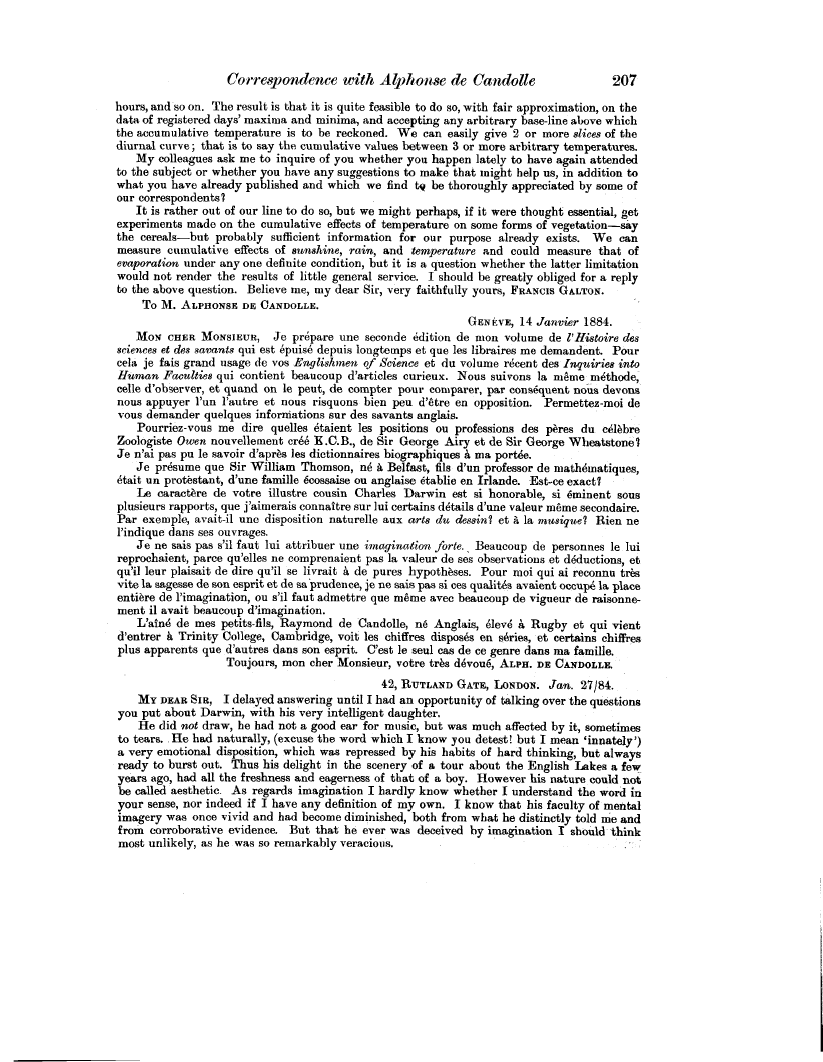Correspondence with Alphonse de Candolle 207
hours, and so on. The result is that it is quite feasible to do so, with fair approximation, on the data. of registered days' maxima and minima, and accepting any arbitrary base-line above which the accumulative temperature is to be reckoned. We can easily give 2 or more slices of the diurnal curve; that is to say the cumulative values between 3 or more arbitrary temperatures.
My colleagues ask me to inquire of you whether you happen lately to have again attended to the subject or whether you have any suggestions to make that might help us, in addition to what you have already published and which we find tq be thoroughly appreciated by some of our correspondents?
It is rather out of our line to do so, but we might perhaps, if it were thought essential, get experiments made on the cumulative effects of temperature on some forms of vegetation-say the cereals-but probably sufficient information for our purpose already exists. We can measure cumulative effects of sunshine, rain, and temperature and could measure that of evaporation under any one definite condition, but it is a question whether the latter limitation would not render the results of little general service. I should be greatly obliged for a reply to the above question. Believe me, my dear Sir, very faithfully yours, FRANCIS GALTON.
To M. ALPHONSE DE CANDOLLE.
GENEVE, 14 Janvier 1884.
MON CHER MONSIEUR, Je prepare une seconde edition de mon volume de l'Histoire des sciences et des savants qui est epuise depuis longtemps et que les libraires me demandent. Pour cela je fais grand usage de vos Englishmen of Science et du volume recent des Inquiries into Human Faculties qui contient beaucoup d'articles curieux. Nous suivons la meme methode, celle d'observer, et quand on le pent, de compter pour comparer, par consequent nous devons nous appuyer Fun l'autre et nous risquons bien peu d'etre en opposition. Permettez-moi de vous demander quelques informations sur des savants anglais.
Pourriez-vous me dire quelles etaient les positions on professions des pures du celebre Zoologiste Owen nouvellement cree S.C.B., de Sir George Airy et de Sir George Wheatstone' Je n'ai pas pu le savoir d'apres les dictionnaires biographiques a ma portee.
Je presume que Sir William Thomson, ne a Belfast, fils d'un professor de mathematiques, etait un protestant, d'une famille ecossaise on anglaise etablie en Irlande. Est-ce exact?
Le caractere de votre illustre cousin Charles Darwin est si honorable, si eminent soul plusieurs rapports, que j'aimerais connaitre sur lui certains details d'une valeur meme secondaire. Par exemple, await-il une disposition naturelle aux arts du dessin? et a la musique? Rien ne l'indique dans ses ouvrages.
Je ne sais pas s'il faut lui attribuer une imagination forte., Beaucoup de personnes le lui reprochaient, parce qu'elles ne comprenaient pas la valeur de ses observations et deductions, et qu'il leur plaisait de dire qu'il se livrait a de pures hypotheses. Pour moi qui ai reconnu tres vite la sagesse de son esprit et de sa prudence, je ne sais pas si ces qualites avaient occupe la place entiere de l'imagination, on s'il faut admettre que meme avec beaucoup de vigueur de raisonnement it await beaucoup d'imagination.
L'aine de mes petits-fils, Raymond de Candolle, ne Anglais, eleve a Rugby et qui vient d'entrer a Trinity College, Cambridge, voit les chiffres disposes en series, et certains chiffres plus apparents que d'autres dans son esprit. C'est le seul cas de ce genre dans ma famille.
Toujours, mon cher Monsieur, votre tres devoue, ALPH. DE CANDOLLE.
42, RUTLAND GATE, LONDON. Jan. 27/84.
MY DEAR SIR, I delayed answering until I had an opportunity of talking over the questions you put about Darwin, with his very intelligent daughter.
He did not draw, he had not a good ear for music, but was much affected by it, sometimes to tears.. He had naturally, (excuse the word which I know you detest! but I mean `innately') a very emotional disposition, which was repressed by his habits of hard thinking, but always ready to burst out. Thus his delight in the scenery of a tour about the English Lakes a few years ago, had all the freshness and eagerness of that of a boy. However his nature could not be called aesthetic. As regards imagination I hardly know whether I understand the word in your sense, nor indeed if I have any definition of my own. I know that his faculty of mental imagery was once vivid and had become diminished, both from what he distinctly told me and from corroborative evidence. But that be ever was deceived by imagination I should think most unlikely, as he was so remarkably veracious.

